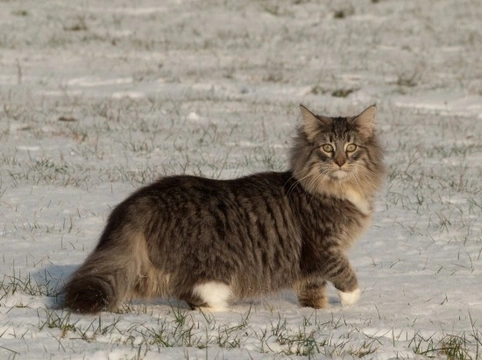
The top 8 largest domestic cat breeds
The domestic cats that we know and love today are all historically descended from African wildcats, and over the course of millennia, cats have spread to all corners of the globe and established themselves into distinctive breed subsections and categories as a result. Consequently, different breeds and types of cats all appear significantly different to each other, and have their own unique traits of appearance and personality that are considered to be signatures of the breed. One of those traits is build and size, and you may be wondering which breeds of domestic cats are the feline giants, or the largest domestic cats commonly kept as pets today.
We’ve done our homework to find out for you, so check out our list of the eight largest domestic cat breeds in the world, for those who are looking for a feline friend that is larger than life!
1. Savannah cat
Coming in at number one is the Savannah cat, recognised to be the largest domestic cat breed overall. There is some dispute, however, as to exactly how domestic the Savannah cat actually is, as this breed is a recent creation that came about from the crossing of domestic cats (most commonly the Siamese) and the a Serval, an African wild cat. This breed of cat is relatively uncommon within the UK, and is not yet recognised by the GCCF (The Governing Council of the Cat Fancy) although it is recognised as a breed in its own right in the USA. Those considering owning a Savannah cat should consider their unique needs carefully before seeking a potential purchase, and the RSPCA has expressed some concerns as to the wide-roaming and hunting nature of these cats and the effect they might have on the UK’s natural wildlife. The size of the Savannah cat can vary considerably depending on how far removed the cat in question is from the Serval side of its ancestry, but the largest cats of this breed can grow to up to 30lb and around the size of a small dog.
2. Maine Coon
The Maine Coon is the largest domestic cat breed that does not have a recent ancestral relationship to wild cats in the way that the Savannah cat does. They are personable and friendly without being overly demanding, and can weigh from 10-15lb for females and 15-25lb for males. They are also very long and tall!
3. Chausie
The Chausie is very rare within the UK, with some Chausie fanatics even going as far as France to find Chausie kittens for sale, and when they are bred within the UK they usually attract a premium price and are in great demand! They are an attractive looking cat with an appearance similar to the jungle cats from whom they descend. Fourth generation and Chausie cats even more distantly removed from their wild ancestors are considered to be suitable for general domestic ownership. The female Chausie can range from 8-15lb in weight, while the males can reach up to 22lb.
4. Ragdoll
The Ragdoll is a large, longhaired cat with a sweet, calm temperament and kind nature. They are fairly sedentary and make an excellent companion for quiet people who have lots of time to dedicate to this affectionate feline! Females of the breed generally weigh from 10-15lb, with males reaching 15-20lb as standard.
5. Ragamuffin
The Ragamuffin cat is related to the Ragdoll, and shares many of the common traits of the breed. They are a strongly built breed of cat with a dense muscle structure, which takes four to five years to fully develop. It can take up to three years old or even longer for the Ragamuffin to reach their adult weight, which is around 10-15lb for females and as much as 20lb for males.
The Norwegian Forest Cat is a longhaired breed hailing from Norway, and one that is no stranger to cold, harsh climates! At first glance they appear similar to the Maine Coon breed, and are very popular both in Norway and the surrounding Scandinavian countries. The Norwegian Forest Cat is very long in length, and grows to up to 15lb in weight for females and 15-20lb for males.
7. Siberian
The Siberian cat hails from Russia, and is one of the cat breeds that are considered to be a good choice for allergy sufferers, as they produce less of the Fel D1 protein that is a common allergenic trigger in people who are susceptible to it. The Siberian cat is generally considered to be a sturdy, chunkily built cat, with females on average weighing 8-12lb and males up to an average of 17lb and sometimes significantly more!
There are a few different varieties of Bobtail cat, such as the Japanese, American and Kurilian, although the three breeds are not usually considered to be related. The Bobtail cat’s short or absent tail comes about due to a genetic mutation such as is found in the Manx cat, leading to the development of a stunted tail or no tail at all! Again, the Manx cat is not related to any of the Bobtail cat varieties.
The American Bobtail is the largest of the Bobtail cat types, with females averaging 7-11lb and males reaching 12-16lb as standard.
Cat size, health and weight
Some domestic mixed breed cats or moggies may reach similar sizes and weights to some of the above mentioned cats, due to a natural propensity to being large and muscular, or possibly, having an ancestral history related to one of the larger breeds of cats. However, if you do not know your cat’s ancestral history, it is especially important to monitor their weight and activity levels. It is vital to ensure that if your cat is tipping the scale at the heavier end of the spectrum, this is due to their natural propensity to being muscular or tall; and not simply because they are overweight and getting too much food or not enough exercise.



